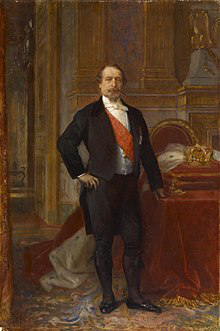

First President of France
20 April 1808 Paris, French Empire
9 January 1873(1873-01-09) (64) Chislehurst, England, United Kingdom
NamesCharles Louis Napoléon Bonaparte
"Louis Napoleon" redirects here. For other uses, see Louis Napoleon (disambiguation). First President of France and then Emperor of the French as a member of the House of Bonaparte Emperor of the French Napoleon IIINapoleon III by Alexandre Cabanel, c. 1865 . This was Empress Eugénie's favourite portrait, since it represented his person most faithfully.Emperor of the French (more...) Reign2 December 1852 – 4 September 1870 Cabinet ChiefsSee list PredecessorNapoleon II (1815; disputed), Louis-Philippe I (as King of the French)SuccessorMonarchy abolishedPresident of France In office20 December 1848 – 2 December 1852Prime MinisterOdilon Barrot Alphonse Henri d'Hautpoul Léon Faucher PredecessorOffice establishedSuccessorAdolphe Thiers (1871)Born(1808-04-20 ) 20 April 1808 Paris, French EmpireDied9 January 1873(1873-01-09) (aged 64) Chislehurst, England, United KingdomBurialSt Michael's Abbey, FarnboroughSpouseEugénie de Montijo (m. 1853 )IssueNapoléon, Prince ImperialHouseBonaparteFatherLouis I of HollandMotherHortense de BeauharnaisReligionRoman CatholicismSignatureMilitary careerAllegiance Second French EmpireService/branch French Armed Forces Years of service1859-1870Rank Commander-in-chief of the French Armed Forces (1848-1870) Unit Army of the Rhin (1870) Army of Chalons (1870) Battles/wars Second Italian War of Independence Battle of Solferino Franco-Prussian War Battle of Saarbrücken Battle of Sedan Napoleon III (Charles Louis Napoléon Bonaparte; 20 April 1808 – 9 January 1873) was the first president of France (as Louis-Napoléon Bonaparte) from 1848 to 1852 and the emperor of the French from 1852 to 1870. A nephew of Napoleon I, he was the last monarch to reign over France. Elected to the presidency of the Second Republic in 1848, he seized power by force in 1851, when he could not constitutionally be reelected; he later proclaimed himself Emperor of the French. He founded the Second Empire, reigning until the defeat of the French Army and his capture by Prussia and its allies at the Battle of Sedan in 1870. Napoleon III was a popular monarch, who used plebiscites to guide his actions, oversaw the modernisation of the French economy and worked to have the centre of Paris rebuilt following Napoleon III style guidelines. He expanded the French overseas empire and made the French merchant navy the second largest in the world, engaged in the Second Italian War of Independence as well as the disastrous Franco-Prussian War, in which he commanded his soldiers during the fight and was captured. Napoleon III commissioned a grand reconstruction of Paris carried out by the man he appointed as prefect of the Seine, Baron Georges-Eugène Haussmann, accompanied by an elaborate system of parks and gardens. He launched similar public works projects in all other major cities in France. He expanded and consolidated the railway system throughout the nation, as well as acted to modernise the banking system. Napoleon III promoted the building of the Suez Canal and established modern agriculture, which ended famines in France and made the country an agricultural exporter. He negotiated the 1860 Cobden–Chevalier Free Trade Agreement with Britain and similar agreements with France's other European trading partners. Social reforms included giving French workers the right to strike and the right to organise. The first female students were admitted at the Sorbonne and educational opportunities for women were increased, as was the list of required subjects in public schools. In foreign policy, Napoleon III aimed to reassert French influence in Europe and around the world. In Europe, he allied with Britain and defeated Russia in the Crimean War (1853–1856). His regime assisted Italian unification by defeating the Austrian Empire in the Franco-Austrian War and later annexed Savoy and Nice through the Treaty of Turin as its deferred reward. At the same time, his forces defended the Papal States against annexation by Italy. He was also favourable towards the 1859 union of the Danubian Principalities, which resulted in the establishment of the United Principalities of Moldavia and Wallachia. Napoleon III doubled the area of the French overseas empire with expansions in Asia, the Pacific and Africa. On the other hand, the intervention in Mexico, which aimed to create a Second Mexican Empire under French protection, ended in total failure. From 1866, Napoleon III had to face the mounting power of Prussia as its Chancellor Otto von Bismarck sought German unification under Prussian leadership. In July 1870, Napoleon III reluctantly declared war on Prussia after pressure by the public. Without allies and with inferior military forces, the French Army was rapidly defeated as Napoleon III was captured at Sedan. He was swiftly dethroned and the Third Republic was proclaimed in Paris. He went into exile in England, where he died in 1873.

We use cookies
We use cookies and other tracking technologies to improve your browsing experience on our website, to show you personalized content and targeted ads, to analyze our website traffic, and to understand where our visitors are coming from. Privacy Policy.